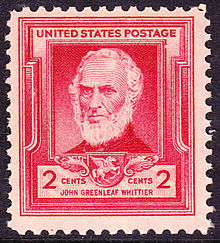J G Whittier on ‘The Lowell Offering’
An excerpt from “The Lighting Up,” an essay in The Prose Works of John Greenleaf Whitter: Volume II (Boston: Ticknor and Fields, 1866). The essay was first published in book form in 1843 in a collection called The Stranger in Lowell, which brought together several essays that had appeared in a newspaper, The Middlesex Standard, of which Whittier was the editor for a time.—PM
.
“. . . The Offering originated in a reading society of the mill girls, which, under the name of the Improvement Circle, was convened once a month. At its meetings, pieces written by its members and dropped secretly into a sort of ‘lion’s mouth,’ provided for the purpose of insuring the authors from detection, were read for the amusement and criticism of the company. This circle is still in existence; and I owe to my introduction to it some of the most pleasant hours I have passed in Lowell.
“The manner in which the Offering has been generally noticed in this country has not, to my thinking, been altogether in accordance with good taste or self-respect. It is hardly excusable for men, who, whatever may be their position, have, in common with all of us, brothers, sisters, or other relations busy in workshop and dairy, and who have scarcely washed from their own professional hands the soil of labor, to make very marked demonstrations of astonishment at the appearance of a magazine whose papers are written by factory girls. As if the compatibility of mental cultivation with bodily labor and the equality and brotherhood of the human family were still open questions, depending for their decision very much on the production of positive proof that essays may be written and carpets woven by the same set of fingers !
“The truth is, our democracy lacks calmness and solidity, the repose and self-reliance which come of long habitude and settled conviction. We have not yet learned to wear itsa simple truths with the graceful ease and quiet air of unsolicitous assurance with which the titled European does his social fictions. As a people, we do not feel and live out our great Declaration. We lack faith in man, — confidence in simple humanity, apart from its environments.”
” ‘The age shows, to my thinking, more infidels to Adam,
Than directly, by profession, simple infidels to God.’ (Elizabeth B. Browning) “
